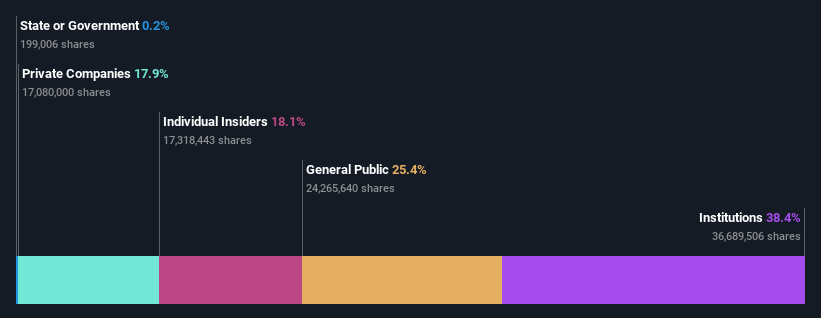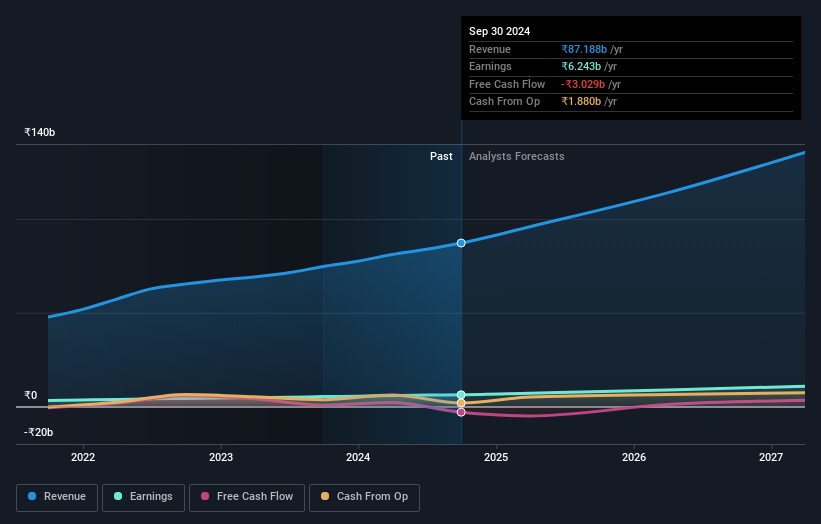- India
- /
- Electrical
- /
- NSEI:KEI
Institutional investors in KEI Industries Limited (NSE:KEI) see ₹19b decrease in market cap last week, although long-term gains have benefitted them.

Key Insights
- Given the large stake in the stock by institutions, KEI Industries' stock price might be vulnerable to their trading decisions
- The top 14 shareholders own 50% of the company
- Insider ownership in KEI Industries is 18%
If you want to know who really controls KEI Industries Limited (NSE:KEI), then you'll have to look at the makeup of its share registry. We can see that institutions own the lion's share in the company with 38% ownership. In other words, the group stands to gain the most (or lose the most) from their investment into the company.
Losing money on investments is something no shareholder enjoys, least of all institutional investors who saw their holdings value drop by 4.6% last week. However, the 29% one-year return to shareholders may have helped lessen their pain. We would assume however, that they would be on the lookout for weakness in the future.
In the chart below, we zoom in on the different ownership groups of KEI Industries.
View our latest analysis for KEI Industries

What Does The Institutional Ownership Tell Us About KEI Industries?
Institutions typically measure themselves against a benchmark when reporting to their own investors, so they often become more enthusiastic about a stock once it's included in a major index. We would expect most companies to have some institutions on the register, especially if they are growing.
KEI Industries already has institutions on the share registry. Indeed, they own a respectable stake in the company. This can indicate that the company has a certain degree of credibility in the investment community. However, it is best to be wary of relying on the supposed validation that comes with institutional investors. They too, get it wrong sometimes. When multiple institutions own a stock, there's always a risk that they are in a 'crowded trade'. When such a trade goes wrong, multiple parties may compete to sell stock fast. This risk is higher in a company without a history of growth. You can see KEI Industries' historic earnings and revenue below, but keep in mind there's always more to the story.

Hedge funds don't have many shares in KEI Industries. Looking at our data, we can see that the largest shareholder is the CEO Anil Gupta with 16% of shares outstanding. For context, the second largest shareholder holds about 8.3% of the shares outstanding, followed by an ownership of 3.6% by the third-largest shareholder.
A closer look at our ownership figures suggests that the top 14 shareholders have a combined ownership of 50% implying that no single shareholder has a majority.
While studying institutional ownership for a company can add value to your research, it is also a good practice to research analyst recommendations to get a deeper understand of a stock's expected performance. There are a reasonable number of analysts covering the stock, so it might be useful to find out their aggregate view on the future.
Insider Ownership Of KEI Industries
While the precise definition of an insider can be subjective, almost everyone considers board members to be insiders. The company management answer to the board and the latter should represent the interests of shareholders. Notably, sometimes top-level managers are on the board themselves.
I generally consider insider ownership to be a good thing. However, on some occasions it makes it more difficult for other shareholders to hold the board accountable for decisions.
Our most recent data indicates that insiders own a reasonable proportion of KEI Industries Limited. Insiders own ₹70b worth of shares in the ₹389b company. That's quite meaningful. Most would say this shows a good degree of alignment with shareholders, especially in a company of this size. You can click here to see if those insiders have been buying or selling.
General Public Ownership
With a 25% ownership, the general public, mostly comprising of individual investors, have some degree of sway over KEI Industries. While this group can't necessarily call the shots, it can certainly have a real influence on how the company is run.
Private Company Ownership
It seems that Private Companies own 18%, of the KEI Industries stock. Private companies may be related parties. Sometimes insiders have an interest in a public company through a holding in a private company, rather than in their own capacity as an individual. While it's hard to draw any broad stroke conclusions, it is worth noting as an area for further research.
Next Steps:
It's always worth thinking about the different groups who own shares in a company. But to understand KEI Industries better, we need to consider many other factors. Be aware that KEI Industries is showing 2 warning signs in our investment analysis , and 1 of those is a bit unpleasant...
If you are like me, you may want to think about whether this company will grow or shrink. Luckily, you can check this free report showing analyst forecasts for its future.
NB: Figures in this article are calculated using data from the last twelve months, which refer to the 12-month period ending on the last date of the month the financial statement is dated. This may not be consistent with full year annual report figures.
Valuation is complex, but we're here to simplify it.
Discover if KEI Industries might be undervalued or overvalued with our detailed analysis, featuring fair value estimates, potential risks, dividends, insider trades, and its financial condition.
Access Free AnalysisHave feedback on this article? Concerned about the content? Get in touch with us directly. Alternatively, email editorial-team (at) simplywallst.com.
This article by Simply Wall St is general in nature. We provide commentary based on historical data and analyst forecasts only using an unbiased methodology and our articles are not intended to be financial advice. It does not constitute a recommendation to buy or sell any stock, and does not take account of your objectives, or your financial situation. We aim to bring you long-term focused analysis driven by fundamental data. Note that our analysis may not factor in the latest price-sensitive company announcements or qualitative material. Simply Wall St has no position in any stocks mentioned.
About NSEI:KEI
KEI Industries
Manufactures, sells, and markets wires and cables in India and internationally.
Flawless balance sheet with reasonable growth potential.

